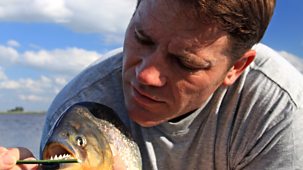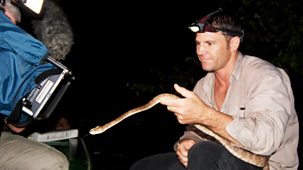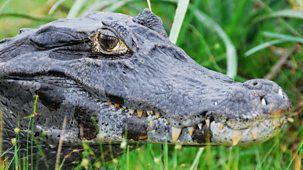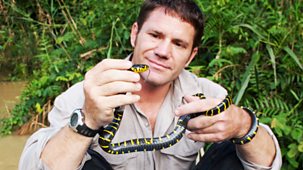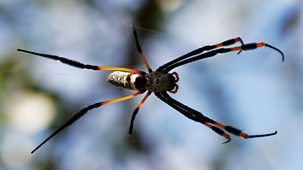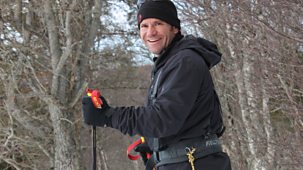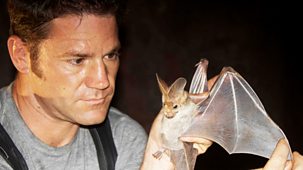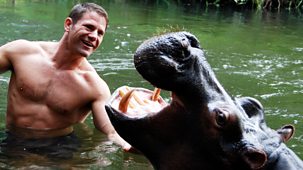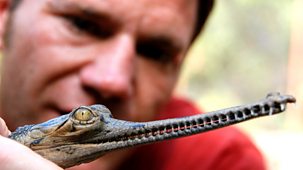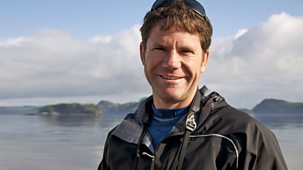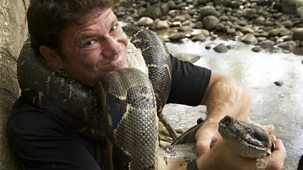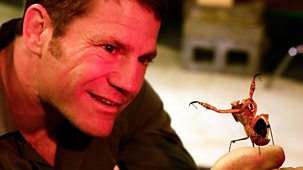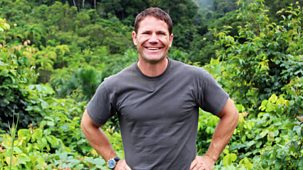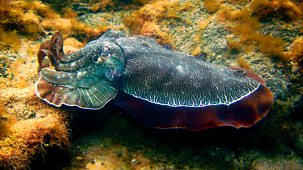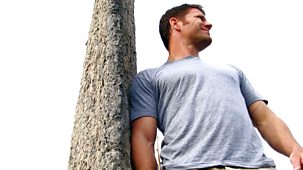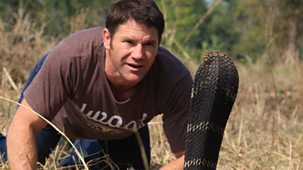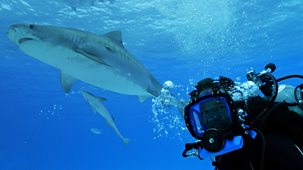
Series 4: 8. Shark Rescue Special
Sharks are a mainstay of Steve’s Deadly 60, slicing through his ratings with their size, speed and power. They are among the most spectacular predators on the planet - but they’re in trouble. Each year, 100 million sharks are killed by people and a quarter of all sharks and rays are now threatened with extinction - but why are they under threat? And what can we all do to help?\n\nIn this special episode of Deadly 60, Steve travels to the Bahamas, shark capital of the world, to find out what it will take to save our sharks. He starts with a shark new to the Deadly 60 – the great hammerhead. These monster sharks are solitary predators given a wide berth by other sharks, and with good reason - they eat a huge range of prey from rays to octopus to smaller sharks, even other hammerheads. The dive gets pretty intense with hammerheads everywhere and Steve needs eyes in the back of his head to keep track of them all.\n\nSharks don’t just stay in one place and can migrate huge distances. It’s therefore important to understand where they go if we are to help them. Steve joins shark scientist Stephen Kaijura as he takes to the skies to survey one of the most spectacular animal gatherings on earth – the migration of thousands of blacktip sharks along the Florida coast. A mass of black shapes surge and swirl in the water, metres away from unsuspecting bathers, who are completely safe. Stephen explains that this migration has been happening for millennia but is now under threat due to climate change.\n\nHowever, by far the greatest threat to sharks comes from humans killing them on a devastating scale. They are caught for their meat and often just for their fins, which are used to make shark fin soup, considered a delicacy across much of Asia. A kilo of shark fins can sell for up to $650, and often the rest of the shark is simply thrown back in the sea once the fin has been removed.\n\nScientists estimate as many as 273 million sharks could be killed every year, but there is hope! Steve finds it back in the Bahamas, kitting up for a very special dive in a place close to his heart: Tiger Beach, home of possibly the world’s greatest shark dive. Explaining how this site has been protected by the Bahamian people, Steve sits on the edge of the boat and gets the sleeve of his wetsuit chomped by a hungry lemon shark. He dons chainmail sleeves to protect his hands and arms and jumps in. He is quickly surrounded by nurse sharks, bull sharks and more great hammerheads, but the star attraction soon appears – the tiger shark. A cleverly camouflaged hunter, with serrated teeth that can slice through shell and bone, the tiger shark is a founding member of the Deadly 60. They crowd around Steve, dwarfing all the other sharks , providing one of the most dramatic wildlife encounters in the world.\n\nBack at the surface, Steve explains that in the Bahamas sharks are worth more alive than dead, and that could be a model for shark conservation worldwide.
Source: CBBC
Most recent episodes of Deadly 60
Deadly 60
Series 2: 1. Baja California, Mexico
Steve travels to the deadliest desert on the planet, the Baja peninsula in Mexico, where he goes searching for a gruesome savage killer in the form of a tarantula hawk wasp. Thi ...
25-02-2026
CBBC
Deadly 60
Series 2: 19. Argentina
Steve and the crew turn cowboy as they head for the marshlands of Argentina. There's a nasty surprise in store for Steve as he searches for an anaconda. Undeterred, he swims in ...
25-02-2026
CBBC
Deadly 60
Series 2: 4. Costa Rica
Steve and the crew are thrown deep in the steamy rainforests of Costa Rica. They are on a mission to find the largest cat in South America - the awesome jaguar. But the jungle i ...
24-02-2026
CBBC
Deadly 60
Series 2: 18. Uk
Steve and the Deadly 60 team are on their home turf, the UK. The adventure begins in a lake as Steve dives in to track down a deadly monster lurking in its depths. Then it's off ...
24-02-2026
CBBC
Deadly 60
Series 2: 17. Norway
Steve and his trusty team head to the frozen north of Norway. He follows the tracks of Europe's largest cat, the elusive lynx, up into the hills in the hope of seeing one, and g ...
23-02-2026
CBBC
Most popular episodes of Deadly 60
Deadly 60
Series 2: 5. Costa Rica
Steve Backshall and his long-suffering crew return for a series of deadly encounters with animals hoping to earn a place on his hallowed Deadly 60 list.\n\nSteve and the team ar ...
29-01-2026
CBBC
Deadly 60
Series 3 - Killer Shots
Wildlife series. Steve Backshall reveals the advanced camera technology and tricks of the trade that allow him and the Deadly 60 crew to film stunning images.
18-03-2025
CBBC
Deadly 60
Series 2: 13. Thailand
In Thailand, Steve comes face-to-face with the longest venomous snake in the world, the king cobra, whose bite could kill an elephant. He meets two of Thailand's killer cats for ...
10-02-2026
CBBC


